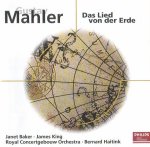This 1975 Concertgebouw performance of Mahler’s Song of the Earth, led by Bernard Haitink with soloists Janet Baker and James King, rates as the finest of all recorded versions of the work. Both soloists are superb. King invests the opening “Drinking Song of the Earth’s Misery” with a palpable sense of outrage–even disgust–at the human condition. Take his lines in the third stanza, “An all dem morschen Tande dieser Erde!” (“in all the rotten trash of this earth!”); seldom has the venom, terror, and ecstasy registered so graphically. King’s portrayal of Spring’s Drunkard (No. 5) is fine, too, but Janet Baker’s delivery of the mezzo’s allocation of Hans Bethge texts is no less moving nor apposite. Particularly memorable are No. 2, “Autumn Loneliness”, and “Von der Schönheit” (“Of Beauty”). Baker’s vocal inflection always is carefully modulated to give maximum emphasis to individual words, and in this regard her contributions invite direct comparison with the legendary Kathleen Ferrier/Julius Patzak/Vienna Philharmonic performance (1952) under Bruno Walter, available on Decca.
Walter’s personal contact with the composer often gave his Mahler interpretations special legitimacy. However, I don’t find Ferrier as effective as Baker, particularly in the closing “Der Abschied” (“Farewell”), and the haunting nostalgia that Baker breathes into the final lines is special indeed. A word, too, about Bernard Haitink’s direction. Few conductors attain comparable gravitas while remaining absolutely faithful to Mahler’s directions. Note how the Concertgebouw violins really do play “As if tired” at the start of No. 2, and how Haitink makes us aware of the importance of the pentatonic (five-note) scale underscoring the Chinoiserie that runs throughout the work. Best of all is Haitink’s masterful elucidation of the half-hour long finale. Baker’s last “ewig” (“forever”) hangs in the ether–and it’s one of the most breathtaking moments ever captured on disc! This is the only Das Lied you’ll ever need, and the recorded sound is of demonstration quality–superior, even, to the new Reference Recordings version with De Young, Villars, and the Minnesota Orchestra under Eiji Oue, released earlier in 2000. [1/8/2001]
































